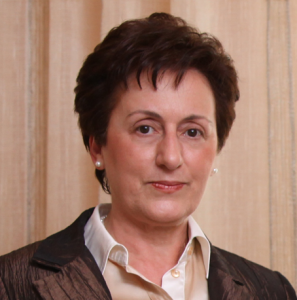
Helen Karatza
Professor Emeritus
Department of Informatics
Aristotle University of Thessaloniki, Greece
karatza@csd.auth.gr
Optimal Scheduling of Real-Time Applications in Cloud, Fog and Mist Computing Environments Current Status and Research Challenges
Abstract:
In recent years, the proliferation of Internet of Things (IoT) technologies and applications has led to an exponential increase in data volumes generated by IoT devices, rendering traditional cloud computing inadequate for efficient data transfer. Consequently, Fog and Mist computing paradigms have emerged as viable solutions aimed at addressing challenges pertaining to network bandwidth, transmission latency, and security. Given the time-sensitive nature of most IoT applications, ensuring timely data processing is paramount. Thus, in such computing environments, the adoption of efficient scheduling schemes is critical to guaranteeing real-time workload execution and maximizing the utilization of cloud, fog, and mist computing systems. The aim of this keynote presentation is to introduce innovative methodologies for addressing the complexities inherent in resource allocation and scheduling of real-time applications within cloud, fog, and mist computing environments. Furthermore, insights into forthcoming trends and avenues within this domain will be offered to guide future research endeavors.
Biodata:
Helen D. Karatza (senior member of IEEE, ACM, SCS) is a Professor Emeritus in the Department of Informatics at the Aristotle University of Thessaloniki, Greece. Dr. Karatza’s research interests include cloud, fog and mist computing, energy efficiency, fault tolerance, resource allocation, scheduling algorithms and real-time distributed systems. Dr. Karatza has authored or co-authored over 250 technical papers and book chapters including seven papers that earned best paper awards at international conferences. She served as an elected member of the Board of Directors at Large of the Society for Modeling and Simulation International. She served as chair and keynote speaker in international conferences. Dr. Karatza is Senior Associate Editor of the Elsevier journal “Simulation Modelling Practice and Theory”, an Editor of “Future Generation Computer Systems” of Elsevier, an Associate Editor of IEEE Transactions on Services Computing and an Editorial Board member of Cluster Computing of Springer. She was Editor-in-Chief of the Elsevier journal “Simulation Modelling Practice and Theory”, Editor-in-Chief of “Simulation Transactions of The Society for Modeling and Simulation International”, Associate Editor of “ACM Transactions on Modeling and Computer Simulation” and Senior Associate Editor of the “Journal of Systems and Software” of Elsevier. She served as Guest Editor of Special Issues in several international journals. More info about her activities and publications can be found at: http://netcom.csd.auth.gr/~karatza/

Ahmed Saleh AlBalooshi
Managing Director, Consultant, & Instructor
Fintech ICT Consultations
Keynote Title: Artificial Intelligence Reshapes the Future of Education
Ahmed Saleh Albalooshi is a seasoned executive and thought leader in Information Technology with over 35 years of experience in management. He has held key leadership positions in major organizations such as Gulf Air, SABRE, EDS, and Bahrain Islamic Bank. Currently, he is the Managing Director of Fintech IT Consultations, specializing in driving innovation through Fourth Industrial Revolution technologies, including Artificial Intelligence, Machine Learning, Big Data, Blockchain, and many other advanced techs. He holds a Bachelor's degree in Computer Science (CS) and is a certified expert in AI, Data Science, Blockchain, Advanced Networking & Data Security, NFTs, and Metaverse. He also plays a pivotal role as a financial analyst with deep insights into stock markets and cryptocurrencies. He is a sought-after trainer, lecturer, and public speaker who regularly facilitates discussions at international conferences related to cutting-edge technologies. He is a member of the International Group of Artificial Intelligence Group (IGOAI) and a charter member of the Bahraini IT Professionals Toastmasters Club (BITP). Additionally, he holds memberships in prominent international Fintech organizations such as Faster Community, Islamic FIN, and Fintech CEO. Ahmed's leadership and contributions to the ICT industry have earned him multiple accolades, including three CIO 200 awards, recognizing him as one of the top ICT leaders in the Middle East.

Prof. Dr. Fateh Muhammad Marri
Vice Chancellor
Sindh Agriculture University Tandojam, Pakistan
Keynote Title: Knowledge Economy

Dr Shahbaz Pervez Chattha
Program Leader
School of Information Technology
Whitecliffe, Newzeland
Keynote Title: Effectiveness of Artificial Intelligence in cyber security to Mitigate Cyber Threats
Dr Shahbaz Chattha is a Cyber Security Professional with over two decades of immersive experience. He has a proven track record in driving impactful strategies across Information Security Governance, Risk, and Compliance (GRC) domains. With a focus on Cyber Defense and the implementation of Governance Frameworks and Standards, he possesses a depth of expertise in orchestrating robust Information Security Management Systems (ISMS) and Cybersecurity controls.
Ph.D. in Computer Engineering and specialized focus on Information & Cyber Security, Supported by a roster of esteemed international certifications including Certified Ethical Hacker, CISM, CCIE Security, CompTIA Security+, Cisco Certified & EC-Council Certified Instructor (EC-I) for expert level Cyber Security Certifications.
His commitment extends to championing the advancement and innovation of IT and Cybersecurity realms, ensuring the integrity and privacy of enterprises and communities alike.

Prof. Dr. Noor Zaman Jhanjhi
Professor
School of Computer Science,
Taylor’s University
Title: Cybersecurity issues and challenges in the era of Generative AI
As technology rapidly advances, Generative AI is transforming industries with its powerful capabilities in content creation, automation, and decision-making. However, alongside these benefits come significant cybersecurity challenges that demand our immediate and strategic focus. This keynote talk will explore the cybersecurity issues that are emerging in this new era of Generative AI, particularly how these technologies can be misused—such as creating realistic deepfakes, automating cyberattacks, and crafting sophisticated phishing schemes. We’ll examine the vulnerabilities that AI-driven systems face and discuss the ethical implications of these technologies falling into the wrong hands. Additionally, the talk will cover the challenges of securing AI models and data against adversarial attacks, maintaining data integrity, and protecting sensitive information in an increasingly interconnected world. By sharing real-world examples and the latest research, this keynote aims to provide cybersecurity professionals, researchers, and policymakers with the knowledge and tools needed to defend against the evolving threats posed by Generative AI.
Prof. Dr. Noor Zaman Jhanjhi (N.Z. Jhanjhi) is a distinguished Professor in Computer Science, specializing in Cybersecurity and Artificial Intelligence, at the School of Computer Science, Taylor’s University, Malaysia. He also serves as the Program Director for Postgraduate Research Degree Programmes. Prof. Jhanjhi has been recognized as one of the world’s top 2% research scientists globally for 2022 and 2023 and is ranked among the top three computer science researchers in Malaysia. In 2022, he was honored as an Outstanding Faculty Member by MDEC Malaysia. Prof. Jhanjhi has an extensive publication record, with over 600 publications indexed in highly reputable databases such as WoS/ISI/SCI/Scopus, amassing a collective research impact factor exceeding 1000. His Google Scholar H-index stands at 69 with an i10-index nearing 323, while his Scopus H-index is 50. Additionally, he holds several international patents, including those from Australia, Germany, the UK, and Japan. He has authored and edited over 60 research books with world-class publishers such as Springer, IGI Global USA, Taylor and Francis, Elsevier, Wiley, and Intech Open. Prof. Jhanjhi has successfully supervised and co-supervised more than 38 postgraduate scholars to the completion of their degrees. As an Associate Editor and member of the Editorial Board for numerous reputable journals, including PeerJ Computer Science, CMC Computers, Materials & Continua, and Frontier in Communication and Networks, Prof. Jhanjhi has made significant contributions to academic publishing. He received the Outstanding Associate Editor award for IEEE ACCESS and is an active reviewer for top-tier journals, being recognized globally as a top 1% reviewer by Publons (Web of Science). Prof. Jhanjhi has evaluated over 60 PhD and Master’s theses as an external examiner for various universities worldwide. He has successfully completed over 40 internationally funded research grants and has been a keynote and invited speaker at more than 60 international conferences, often chairing conference sessions. With a decade of experience in academic accreditation, including ABET, NCAAA, and NCEAC, Prof. Jhanjhi’s research interests encompass Cybersecurity, Artificial Intelligence, IoT Security, Wireless Security, Data Science, Software Engineering, and UAVs.

Prof. Dr Sayan Kumar Ray
Professor
Taylor’s University
MalaysiaTitle: Metaverse in the 6G Era: Recent Advancements and Challenges to Overcome
Metaverse is an evolving paradigm that intends to provide 3D immersive experiences and self–sustaining virtual shared space that people can access via the Internet. Technologies like virtual reality (VR) and augmented reality (AR) are combined in the metaverse to create a sense of ‘virtual presence – Internet in its 3D form’. To achieve its full potential, Metaverse must satisfy specific requirements, including low latency, high resource demands, robust network infrastructure, handling massive data volume, high data rate, security concerns, application interoperability to mention a few. 5G networks cannot support all these requirements to realize the true potential of Metaverse. It is envisioned that future 6G networks can help the different Metaverse applications to flourish to their full potential. This talk will discuss recent advancements in Metaverse and 6G networks, including how Artificial Intelligence and Machine Learning are changing Metaverse applications. Different research challenges will be highlighted as well.
Prof. Dr Sayan Kumar Ray is currently the Head of School of Computer Science and an Professor at Taylor’s University, Malaysia. Prior to this, he worked at Manukau Institute of Technology in Auckland, New Zealand, in different positions including the Head of School of Digital Technologies, Associate Dean of Faculty of Business and Information Technology, Head of Networking programmes, and Academic Leader of Research and Curriculum Development of Digital Technologies. Sayan also worked as Design Engineer at Tait Communications Ltd. In New Zealand and as consultant for other organizations in New Zealand. He completed his Ph.D in Computer Science from University of Canterbury in New Zealand, and Master of Technology and Bachelor of Engineering degrees both in Computer Science and Engineering, respectively, from the University of Calcutta and Gulbarga University in India. As an active researcher, Sayan’s research covers a broad range of topics, like Security and Trusts in Internet of Things (IoT), Intrusion Detection System in IoT, IoT applications in Healthcare and Disaster Management, Cybersecurity of Metaverse, 5G/6G Networks, Mobility and Handover in Multi-tier networks, Dynamic Spectrum Sharing and Management, Private 5G Networks, and Applications of AI and Machine Learning in Healthcare. He regularly publishes in top-tier journals and international conferences and his co-authored papers have featured in reputed venues like IEEE JSAC, IEEE Communications Surveys and Tutorials, IEEE Access, Journal of Networks and Computer Applications, Computer Networks, Future Generation Computer Systems, Sensors, IEEE WCNC, IEEE LCN, PACIS, etc. Sayan’s coauthored papers have won Best Paper Awards in EAI SmartGift 2021 conference, IEEE IEMCON 2020 conference, Alison Young Best Paper Award at CITRENZ 2019 Conference, IEEE ICOIN 2017 conference, Gowri Memorial Best Paper Award in IETE Technical Review Journal, and a Commendation Award at CITRENZ 2022 conference. He has won Research Excellence Award, Outstanding Performance Achievement Award, and Teaching Excellence Award at Manukau Institute of Technology, New Zealand. Sayan regularly gets invited to deliver keynotes and invited talks and has won multiple research grants, and scholarships. He is also the coinventor of two UK patents.
